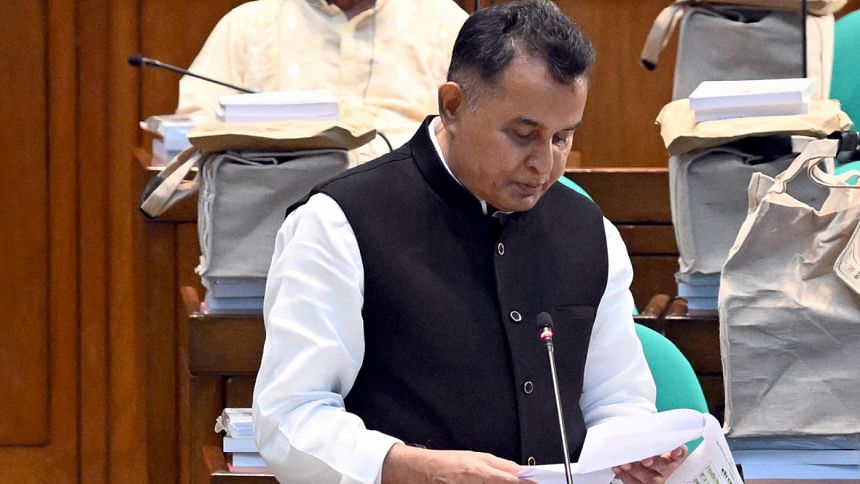No remedy for default loans, forex crisis

Though higher default loans and declining foreign currency reserves have been identified as the biggest risks to the economy of Bangladesh in recent times, Finance Minister AHM Mustafa Kamal yesterday fell short of coming up with any definitive measure to address the twin issues save offering some words of hope.
On the other hand, because of the fiscal policy, which aims a higher government borrowing from the banking system in 2023-24, the pressure on the reserve will pile up further.
In order to rebuild the reserves, Kamal said the current initiatives on import controls, boosting exports and remittance flows, and utilising more foreign loans would continue.
"Hopefully, the reserve situation will improve in a short period of time," the finance minister said in his budget speech.
Since the beginning of the current fiscal year in July last year, the government has followed its measures related to import, export, remittance and foreign loans, but the steps did not pay off to a large extent: imports have stayed at an elevated level and the earnings from export and remittance, the two biggest sources of foreign currencies, have not met expectations.
So, the reserves plunged 29 percent year-on-year to $29.96 billion on May 25 in contrast to $42.29 billion on the same day last year as the country has had to settle import bills to keep the economy functioning.
Zahid Hussain, a former lead economist of the World Bank's Dhaka office, said the target on the deficit financing would compound pressure on the reserves.
"The extent of the pressure will depend on how the financing will be met," he said, terming the plan expansionary.
Kamal has set a deficit financing target of Tk 261,785 crore for 2023-24. Of the amount, Tk 132,395 crore will come from the banking system.
At the beginning of 2022-23, the government aimed to borrow Tk 106,334 crore from both Bangladesh Bank and commercial lenders. Later, it was revised up to Tk 115,425 crore.
Again, a major part of the funds is being sourced from the central bank, which means an injection of fresh money into the economy that entails risks of stoking inflationary pressures and bringing down the reserve level.
US ratings agency Moody's said the reserves would not recover to pre-pandemic levels in the next two-three years.
A wide gap in formal and informal exchange rate has been one of the factors behind the sharp fall in the reserves as it shifts remittances from official channels to unofficial routes and impedes repatriation of export proceeds, according to the World Bank.
Yesterday, Kamal said the process of making the interest rate and the exchange rate market based is going on. He did not give any deadline.
The central bank has maintained a 9 percent cap on loans while there are a number of exchange rates of the US dollar.
The $4.7 billion loan programme of the International Monetary Fund has set a deadline for Bangladesh to put in place a market-determined interest rate and the exchange rate mechanism by July.
"We have to wait until the middle of this month to see what measures are taken in the monetary policy about the two rates," said Zahid Hussain.
The central bank will unveil the monetary policy this month.
In his speech, Kamal said the government would try to remove default loans and other anomalies in the financial sector and continue efforts to develop the banking sector.
The Bangladesh Bank is preparing various procedural guidelines, he said.
"Our government is working to ensure good governance and efficient management in the financial sector."
When he became the finance minister in September 2019, Kamal said the amount of default loans won't increase anymore.
In June 2019, default loans stood at Tk 112,619 crore. It rose to the highest-ever of Tk 134,396 crore in September 2022 before falling to Tk 131,621 in March this year.
According to the World Bank, the extent of troubled assets is obscured by lax regulatory definitions and reporting standards, extended forbearance, as well as weak supervisory enforcement.
"The finance minister did not mention how he will address the major problems in the financial sector like weak balance sheet and corporate governance," Zahid Hussain said.


 For all latest news, follow The Daily Star's Google News channel.
For all latest news, follow The Daily Star's Google News channel. 



Comments